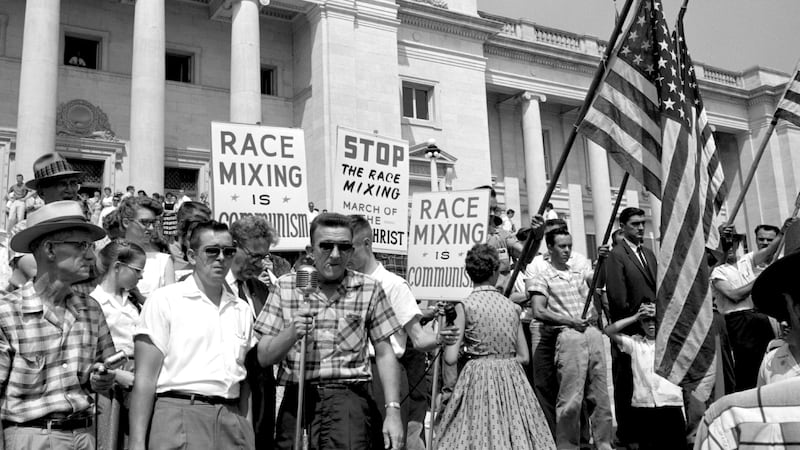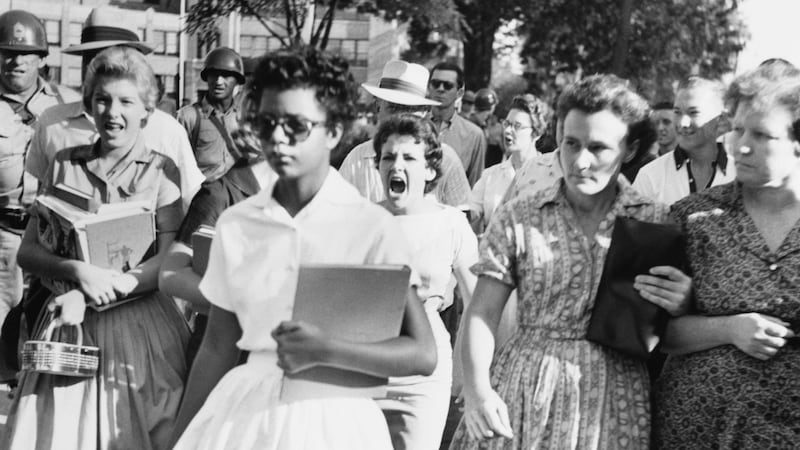On her first day at her new school, Minnijean Brown Trickey and eight friends were met by a violent mob of over 1000 White students protesting their enrolment.
Trickey is one of the Little Rock Nine - the first Black youth to enroll at Little Rock Central High School in Arkansas in 1957.
Trickey is speaking to thousands of students across 11 different locations throughout Aotearoa in a programme called American History through Black Eyes. This includes Auckland, Hamilton, Rotorua, Napier, Wellington, Christchurch and Dunedin.
Her daughter, Spirit Tawfiq, will also speak. Tawfiq is an anti-racism educator who will discuss her experience growing up with a civil rights ‘shero’ mother. Shero is a traditional word in the US meaning the female equivalent of a male hero.
The pair are also joined by Spirit’s husband, Hisham Tawfiq, an actor in The Blacklist who will teach a class on acting.
The first location was at James Cook High School, the school of teacher Roydon Agent who organised the programme and drove the initiative, as Trickey and Spirit said.

American history through Black eyes
For context, in 1871 there was an act passed in Arkansas enforcing “separate but equal” school systems. This is an example of “Jim Crow laws” which enforced racial segregation in the southern states after the civil war.
But the desegregation of schools was called for by the US Supreme Court in 1954. It decided segregated schools were unconstitutional as they violated the 14th amendment to the US Constitution, which protects individual rights and liberties.
After this, the civil rights organisation The National Association for the Advancement of Coloured People (NAACP) registered Trickey and others who wanted to enrol at White schools.
Arkansas governor Orval Faubus tried to stop the integration and called in the Arkansas National Guard to prevent the Black students from entering the school. In response, President Eisenhower ordered the National Guard to instead support the integration and protect the Black students.
Trickey said, despite the racial discrimination of the time, she signed up because the schools were unfair.
“Central High School was known as the most beautiful high School in America, and it was right in the center of the city, and it just seemed logical, It was close to where I lived. It only became historical because of the opposition. Because actually we could have just gone into the school without any violence or confusion or any of that. They made the choice to make it ugly and more horrific,” she said.
Te Ao Māori News asked, if she could go back in time and speak to her younger self, what would she say?
“I would say you have to go. Even though now I know the opposition would be awful but even more, it would be necessary for me to go because you can’t allow society to stay in that horrific state. We have to challenge it.”
The Civil Rights Act of 1964 was intended to bring an end to segregation but Trickey doesn’t believe this to be the case. She said racial discrimination was still rife in the US, with police brutality and recent bans of books covering critical race theory.
“They’re having a hard time right now in the US for many reasons,” Trickey said, “Schools are more segregated, meaning there are Black schools, Latino schools, White schools, all separate. There are different resources for schools, so they’re they’re having a bit of a struggle in the US that they need to work out.”
“Little Rock happened 66 years ago, and it feels like they didn’t learn very much from that.”
We asked Trickey as an advocate for love, non-violence and peace, how she found forgiveness and overcome the trauma after all the abuse, hatred and dehumanisation.
Trickey said there was “some trauma you overcome and some you don’t” but over time she discovered the main feeling she felt was sadness, which she said was a more honest feeling than anger “which doesn’t get one very far”.
After going to Central School she knew the stories of White superiority weren’t true.
“They closed the schools in Little Rock the next year, so I went to a school that was desegregated and I got to be accepted... going to this school were I was accepted, softened my heart.”

Pōhiri at James Cook High School
Yesterday the students of James Cook High welcomed Trickey and her whānau in a pōhiri that brought Trickey to tears.
Trickey said she was moved, inspired and enriched by the pōhiri and said it was something she would carry with her for the rest of her life.
“There are so many terrible things that are going on and that can be extremely overwhelming around the world, various oppressions but today was a reminder of our common humanity and our connection, and our responsibility to one another. And all of that anchored in love and from that lens. I can still feel the ceremony kind of washing over me.”
Spirit Tawfiq also talked about the pōhiri and said, “I’m trying to think of the right word, but the energy and the spirit coming off of the beautiful welcome ceremony feels very akin to what lives inside my body. Our essence like. I don’t even know if there are words to put into it, but that power, that pride, that love, peace connection is what I am feeling right now.”
Trickey came to Aotearoa with her children and grandchildren and they agreed the journey was very much an intergenerational one.
Tawfiq said, “There is a conversation now around the civil rights movement, about intergenerational trauma and as well as the intergenerational strength and wisdom going back many, many generations.”
Trickey said the Little Rock Nine story is important because it was done by young people. And she likes speaking to young people because she wants them to know they are capable of bringing change and they don’t need to wait for a leader.
Tawfiq said watching her mother speak to youth taught her a lot.
“See the world, experience different cultures, open your mind. Seek knowledge. Take hold of your education - you have agency in this. You can go to a school that doesn’t have the resources and that’s deplorable. But at the same time, you can transcend this with your mind, with the ancestors, with the folks who like blazed [a path] before and take it where you want to take it.”


